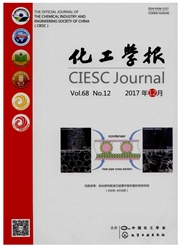

 中文摘要:
中文摘要:
提出两种均以微粒群(PSO)算法对原始训练集随机抽样优化,再结合机器学习算法建立预测模型的PSO算法优化化工建模训练集的思路。思路1首先以模型交叉验证的均方误差函数mse最小为目标优化训练集,再通过对验证集预测,从平行运行得到的多个优化训练集中确定最优训练集用于建模。思路2借鉴提高BP神经网络泛化能力的初期终止(early stop)法,以对验证集预测的mse最小为目标优化训练集,再通过对测试集预测,从平行运行得到的多个优化训练集中确定最优训练集用于建模。通过仿真实验研究和对某炼油厂调和汽油生产数据的具体分析应用,表明本文思路可以较大幅度提高模型的预测准确性,在化工建模中具有推广应用价值。
 英文摘要:
英文摘要:
Two methods were proposed to optimize the training set of chemical engineering modeling based on particle swarm optimization (PSO) with random sampling. The forecasting model was formed by integrating PSO and other machine learning arithmetic which was used to model. In method 1 the optimized training set was acquired firstly by optimizing the training set which set the goal of minimizing the mean of squared errors (mse) in cross validation, secondly by making the prediction to the validation set, and lastly by choosing the one that gave the best prediction results among the optimized training sets. In method 2 the thought of early stop in BP neural network was adopted. The optimized training set was acquired firstly by optimizing the training set which set the goal of minimizing the mse to the validation set, secondly by making the prediction to the testing set, and lastly by choosing the one that gave the best prediction results among the optimized training sets. These two methods were used to deal with the simulation data and the gasoline blending data collected from a refinery. The results showed that the methods could improve the accuracy of prediction greatly. These two methods are worth generalizing in chemical engineering modeling in the future.
 同期刊论文项目
同期刊论文项目
 同项目期刊论文
同项目期刊论文
 期刊信息
期刊信息
